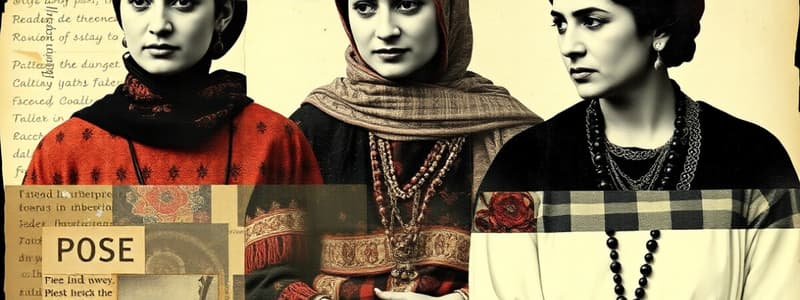Podcast
Questions and Answers
Given the socio-cultural context described, which inference most accurately reflects the nuanced distinction drawn between Malala's parents' approach to gender roles within their Pashtun community?
Given the socio-cultural context described, which inference most accurately reflects the nuanced distinction drawn between Malala's parents' approach to gender roles within their Pashtun community?
- The metaphor of the falcon and the grounded signifies a complementary divergence from typical Pashtun gender roles, where the father challenges societal norms in public life and the mother provides a stable, though not entirely subservient, domestic counterpoint. (correct)
- The description suggests a subtle deviation from rigid Pashtun gender roles, with the father expressing agency in the public sphere, contrasting with the mother who, while 'grounded,' exhibits resilience and quiet influence within the familial domain, indicative of a progressive partnership.
- Malala's parents embody a radical departure from Pashtun norms; the father's actions are depicted as overtly rebellious against cultural expectations, whereas the mother's role is subtly portrayed as equally challenging to traditional passivity through quiet strength.
- Malala's father's 'falcon-like' daring directly contradicts the traditional Pashtun male expectation of absolute patriarchal authority, while her mother's 'grounded' nature reinforces conventional female domesticity.
Considering the described security measures undertaken by Malala's father, which of the following best encapsulates the strategic rationale behind his intermittent absences from home?
Considering the described security measures undertaken by Malala's father, which of the following best encapsulates the strategic rationale behind his intermittent absences from home?
- His nocturnal absences primarily served as a calculated diversionary tactic to mislead potential surveillance, thereby diminishing the predictability of his and his family's movements and enhancing their overall security. (correct)
- These actions were predominantly symbolic, intended to project an image of resilience and defiance against perceived threats, rather than constituting a pragmatically effective security protocol in a high-risk environment.
- Such measures were largely precautionary, aimed at mitigating potential risks associated with increased Taliban scrutiny, while simultaneously allowing him to maintain external engagements deemed critical for his professional and social standing.
- The father's decision to vary his sleeping location was driven by a confluence of factors, including minimizing the risk of targeted attacks on his family residence and establishing covert communication channels with allied individuals.
Analyzing the cousin's actions during the Taliban checkpoint encounter, which interpretation most accurately reflects the underlying motivations driving his seemingly paradoxical behavior regarding the cassette tapes?
Analyzing the cousin's actions during the Taliban checkpoint encounter, which interpretation most accurately reflects the underlying motivations driving his seemingly paradoxical behavior regarding the cassette tapes?
- The cousin's initial action of playing the cassette was an unwitting act of cultural defiance, immediately followed by a pragmatic shift to concealment, indicating a reactive adaptation to the imminent threat rather than calculated risk assessment.
- His behavior reveals a deeply ingrained ambivalence towards the Taliban's edicts, characterized by a momentary lapse into normalcy (playing music) immediately overridden by a survival instinct prompting concealment of 'haram' items. (correct)
- The cousin's actions suggest a sophisticated understanding of the situational dynamics, where the initial playing of music served as a plausible facade of normalcy, followed by a rapid, strategic maneuver to mitigate potential repercussions upon encountering the checkpoint.
- His conduct exemplifies a common coping mechanism within the community, oscillating between adherence to cultural norms (entertainment) and immediate capitulation to extremist demands (hiding tapes), indicative of a society living under duress.
In the context of the Taliban soldier's directive regarding burqas, which of the following interpretations most critically examines the underlying power dynamics and ideological assertions embedded within his seemingly simple command?
In the context of the Taliban soldier's directive regarding burqas, which of the following interpretations most critically examines the underlying power dynamics and ideological assertions embedded within his seemingly simple command?
Considering Malala's emotional response during her encounter with the Taliban soldier – described as 'angry, but I felt nothing but frustration and could not reason with him' – which of the following best elucidates the psychological complexity of her reaction in that specific scenario?
Considering Malala's emotional response during her encounter with the Taliban soldier – described as 'angry, but I felt nothing but frustration and could not reason with him' – which of the following best elucidates the psychological complexity of her reaction in that specific scenario?
Analyzing the content of the letter threatening Malala's school, which of the following best captures the core ideological underpinnings of the Taliban's opposition to female education as articulated in the message?
Analyzing the content of the letter threatening Malala's school, which of the following best captures the core ideological underpinnings of the Taliban's opposition to female education as articulated in the message?
Considering the phrase 'Fedayeen of Islam' used as the signatory in the threatening letter, which of the following best explicates the intended rhetorical and psychological impact of this specific appellation on the recipients?
Considering the phrase 'Fedayeen of Islam' used as the signatory in the threatening letter, which of the following best explicates the intended rhetorical and psychological impact of this specific appellation on the recipients?
When Malala states, 'The Taliban had threatened my father. Now I have fear,' what critical shift in perspective and emotional landscape does this declarative statement most accurately denote within the narrative?
When Malala states, 'The Taliban had threatened my father. Now I have fear,' what critical shift in perspective and emotional landscape does this declarative statement most accurately denote within the narrative?
Considering the broader socio-political context of Swat Valley under Taliban influence, which of the following best interprets the significance of the school being labeled 'Western and infidel' in the threatening letter?
Considering the broader socio-political context of Swat Valley under Taliban influence, which of the following best interprets the significance of the school being labeled 'Western and infidel' in the threatening letter?
Given the escalating threats and restrictions described, which option most accurately assesses the long-term strategic objective underlying the Taliban's actions in Swat Valley, as evidenced by the events narrated?
Given the escalating threats and restrictions described, which option most accurately assesses the long-term strategic objective underlying the Taliban's actions in Swat Valley, as evidenced by the events narrated?
Flashcards
Pashtun Women
Pashtun Women
Pashtun women often faced oppression and were dependent on their husbands.
Falcon-like Father
Falcon-like Father
Malala's father was daring and protective, unlike most Pashtun men.
House Protection
House Protection
Malala was responsible for locking the house while her father was away.
Taliban Encounter
Taliban Encounter
Signup and view all the flashcards
Haram Items
Haram Items
Signup and view all the flashcards
Burqas Requirement
Burqas Requirement
Signup and view all the flashcards
Letter of Warning
Letter of Warning
Signup and view all the flashcards
Teaching Girls
Teaching Girls
Signup and view all the flashcards
Fedayeen of Islam
Fedayeen of Islam
Signup and view all the flashcards
Fear and Distress
Fear and Distress
Signup and view all the flashcards
Study Notes
Pashtun Women and Culture
- Pashtun women often begged and clung to their husbands
- Many Pashtun men ignored their wives
- Few Pashtun men consulted with their wives
Personal Experiences
- The author took on the job of locking the house when her father was away.
- She went around the house several times daily to make sure the doors and windows were locked.
- Sometimes, her father came home quite late or not at all
- He sometimes slept at friends' houses for protection
- She heard her mother pray until all hours
Taliban Encounter
- The author was face-to-face with the Taliban
- Taliban searched cars for forbidden items
- The author saw her mother's fear and worry
- A Talib threatened her and her sister to wear a burqa
- A Taliban soldier was inches from her face
- She felt frustration instead of fear
Travel Incident
- The author traveled to Shangla with her family.
- They did not own a car.
- A cousin gave them a ride
- The cousin put music on but later took it out
- Two men with turbans and camouflage vests approached and carried Kalashnikov rifles
- They demanded valuables
- The family hid the valuable possessions.
School Letter
- A letter was taped to the school gate
- The letter was from the Fedayeen of Islam
- The letter accused the school of being Western and infidel
- It stated the school's uniform was un-Islamic
- The letter threatened the author's father
- The author felt afraid after reading the letter
Studying That Suits You
Use AI to generate personalized quizzes and flashcards to suit your learning preferences.




